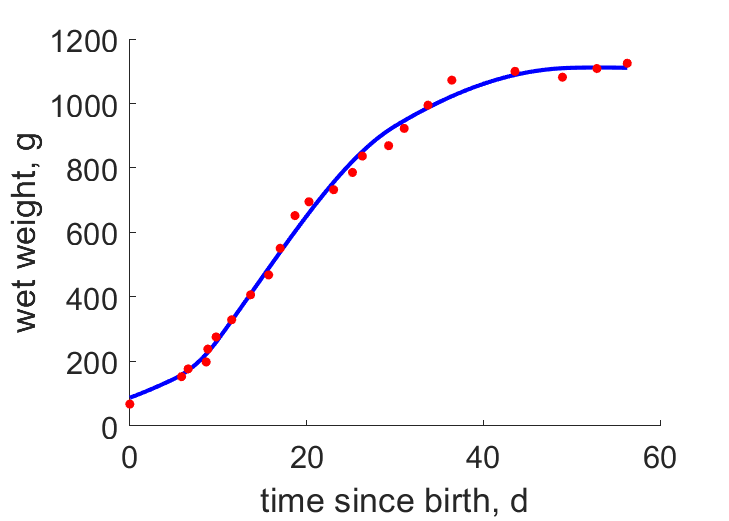Predictions & Data for this entry
| Model: std | climate: BWh, Csb | migrate: Ms | phylum: |
| COMPLETE = 2.5 | ecozone: MPE | food: biCvf, biCi, biSi, biSv | class: |
| MRE = 0.035 | habitat: 0iFe, 0iMm, biMc | gender: Dg | order: |
| SMSE = 0.002 | embryo: Tnsfm | reprod: O | family: |
Zero-variate data
| Data | Observed | Predicted | (RE) | Unit | Description | Reference |
|---|---|---|---|---|---|---|
| ab | 26 | 28.58 | (0.09915) | d | age at birth | avibase |
| tx | 46 | 46.09 | (0.001852) | d | time since birth at fledging | avibase |
| tp | 138 | 128 | (0.07265) | d | time since birth at puberty | guess |
| tR | 1825 | 1825 | ( 0) | d | time since birth at 1st brood | avibase |
| am | 1.237e+04 | 1.238e+04 | (0.0007874) | d | life span | AnAge |
| Wwb | 67.5 | 63.13 | (0.06476) | g | wet weight at birth | avibase |
| Wwi | 799.8 | 849.5 | (0.06209) | g | ultimate wet weight | avibase |
| Wwim | 973 | 975.3 | (0.002388) | g | ultimate wet weight for males | avibase |
| Ri | 0.008219 | 0.008091 | (0.01557) | #/d | maximum reprod rate | avibase |
Uni- and bivariate data
| Data | Figure | Independent variable | Dependent variable | (RE) | Reference |
|---|---|---|---|---|---|
| tW |  | time since birth | wet weight | (0.03099) | Faul2020 |
Pseudo-data at Tref = 20°C
| Data | Generalised animal | Larus occidentalis | Unit | Description |
|---|---|---|---|---|
| v | 0.02 | 0.04157 | cm/d | energy conductance |
| p_M | 18 | 624.5 | J/d.cm^3 | vol-spec som maint |
| k_J | 0.002 | 0.02622 | 1/d | maturity maint rate coefficient |
| k | 0.3 | 0.3074 | - | maintenance ratio |
| kap | 0.8 | 0.8677 | - | allocation fraction to soma |
| kap_G | 0.8 | 0.8 | - | growth efficiency |
| kap_R | 0.95 | 0.95 | - | reproduction efficiency |
Discussion
- males are assumed to differ from females by {p_Am} only
- food availability variable in tW data
- mod_1: v is reduced; high age at first reproduction cannot be captured by the std model
- mod_1: Pseudo-data point k is used, rather than k_J; Data set tp and parameter t_R are added, the latter replacing clutch interval t_N. Postnatal T is based on PrinPres1991, see get_T_Aves. See further the revision page, theme puberty
Bibliography